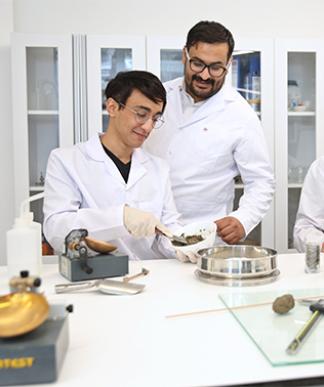


About the Program
Ph.D. in Civil Engineering program covers the fields of structural engineering, geotechnical engineering, hydrology, and material and construction management. Due to the importance of applied learning, our program is among the top institutions that utilizes state-of-the-art research and development laboratories and computer laboratories. Our program offers an education in realization of the importance to generate ethical, entrepreneurial, environmentally-responsible, technologically advanced graduates for national and international platforms of the field of civil engineering without wavering from high-quality educational standards.
Ph.D. in Civil Engineering degree is designed to raise research specialists in the areas of material, geotechnical, structural, clean/waste water and construction management. Purpose of this education is not only to educate research specialists who are up-to-date with necessary engineering and technological knowledge and have the ability to adapt to the new knowledge; but also to have graduates who can advance the field of civil engineering by effectively using their knowledge, self-confidence, communication and research skills they have gained throughout their education.
Education Opportunities
Materials, Geotechnical, Transportation, and Surveying laboratories serve Ph.D. students and help them serve their communities with their research.
Department of Civil Engineering, for use in educational and research purposes, has the following laboratories:
- Construction Materials Laboratory: latest technological equipment to explore the physical, mechanical, and durability properties of all materials that are used in the construction industry;
- Soil Mechanics Laboratory: All necessary equipment to find the physical and mechanical properties of soils;
- Central Laboratory: Equipment required to determine the chemical and mineralogical structure of composite materials;
- Transportation Laboratory: Equipment needed to determine the abrasion resistance of aggregates, CBR test, Marshall test, Viscometer, Compaction equipment;
- Computer Laboratory: Equipment having properties compatible with today’s technology and software packages to be used in designs.
The most important devices included in the laboratories include; Computer-controlled steel tension and low frequency creep detection equipment, steel reinforcement, and stirrup diameter detection equipment, concrete tomography laser, 3-dimensional laser scanning device, scanning electron microscope (SEM), and liquid chromatography-mass spectroscopy (LC-MS/MS).

Career Areas
Graduates, by fulfilling the needs of the society with the specialized education they gained, can pursue a rewarding career in any of the private and governmental educational institutions which operate in various civil engineering fields via transferring the knowledge, application methods and techniques they have learned; and by the attainment of a higher responsibility in management and leadership.
Contact
Institute of Graduate Studies and Research
Graduate Sciences and Education Center, GE106
Tel: +90 392 671 1111 Extension: 2776
Institute E-mail: ciu-institute@ciu.edu.tr
Compulsory Courses
First Semester
ELECTIVE
Course code
CVLE6X1Credit
3Theoretical
3Practical
0Ects
ELECTIVE
Course code
CVLE6X2Credit
3Theoretical
3Practical
0Ects
ELECTIVE
Course code
CVLE6X3Credit
3Theoretical
3Practical
0Ects
ELECTIVE
Course code
CVLE6X4Credit
3Theoretical
3Practical
0Ects
Second Semester
THESIS
Course code
CVLE600Credit
0Theoretical
0Practical
0Ects
QUALIFICATION EXAM
Course code
CVLE650Credit
0Theoretical
0Practical
0Ects
SEMINAR
Course code
CVLE690Credit
0Theoretical
0Practical
0Ects
5ELECTIVE
Course code
CVLE6X5Credit
3Theoretical
3Practical
0Ects
ELECTIVE
Course code
CVLE6X6Credit
3Theoretical
3Practical
0Ects
Philosophy of Science
Course code
PHIL601Credit
3Theoretical
3Practical
0Ects
8Elective Courses
Students who are interested in pursuing advanced graduate studies leading to a master’s, doctoral degree or professional doctorate degree for the Fall and Spring semesters every year. Applicants can directly apply online to our graduate programs using the application portal.
TR Applicants- Required documents:
- Bachelor’s and Master’s Degree Diploma
- Bachelor’s and Master’s Degree transcripts for each completed academic term/year.
- Valid ALES result in document (must not exceed 5 years),
- Documents to prove English proficiency for English language departments,
- Scanned copy of passport or identity card.
Click for detailed admission requirements information.
TRNC Applicants- Required documents:
- Bachelor’s and Master’s Degree Diploma
- Bachelor’s and Master’s Degree transcripts for each completed academic term/year.
- Documents to prove English proficiency for English language departments,
- Scanned copy of passport or identity card.
Click for detailed admission requirements information.
Students who are interested in pursuing advanced graduate studies leading to a master’s, doctoral degree or professional doctorate degree for the Fall and Spring semesters every year. Applicants can directly apply online to our graduate programs using the application portal.
International Applicants- Required documents:
- A valid Bachelor’s Degree and transcripts for each completed academic term/year.
- A valid Master’s Degree and transcripts for each completed academic term/year.
- Evidence of English Language competence: TOEFL (65 IBT) or IELTS (5.5). Students without these documents will take the CIU English proficiency exam on campus following arrival.
- Scanned copy of international passport/birth certificate
- CV
- PhD research proposal
- Fully completed and signed CIU Rules and Regulations document (which can be downloaded during the online application)
Click for detailed admission requirements information.
Cyprus International University provides academic scholarships for its students as an incentive for success, with most students benefiting from 50%, 75% or 100% scholarships or discounted tuition fees. Click for more information.
Click for more to learn about fees in line with the Tuition Fee Calculation system.
| Fee per course | € 650,00 |
| Fee for thesis (4 Semesters) | € 2.600,00 |
| Fee for seminar | € 200,00 |
| Scientific Foundation per course | € 150,00 |
| Annual Registration Fee | € 295,00 |
| VAT Exc. |